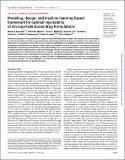Modeling, design, and machine learning-based framework for optimal injectability of microparticle-based drug formulations
Author(s)
Sarmadi, Morteza; Behrens, Adam M; McHugh, Kevin J; Contreras, Hannah TM; Tochka, Zachary L; Lu, Xueguang; Langer, Robert S; Jaklenec, Ana; ... Show more Show less
DownloadPublished version (4.209Mb)
Publisher with Creative Commons License
Publisher with Creative Commons License
Creative Commons Attribution
Terms of use
Metadata
Show full item recordAbstract
Inefficient injection of microparticles through conventional hypodermic needles can impose serious challenges on clinical translation of biopharmaceutical drugs and microparticle-based drug formulations. This study aims to determine the important factors affecting microparticle injectability and establish a predictive framework using computational fluid dynamics, design of experiments, and machine learning. A numerical multiphysics model was developed to examine microparticle flow and needle blockage in a syringe-needle system. Using experimental data, a simple empirical mathematical model was introduced. Results from injection experiments were subsequently incorporated into an artificial neural network to establish a predictive framework for injectability. Last, simulations and experimental results contributed to the design of a syringe that maximizes injectability in vitro and in vivo. The custom injection system enabled a sixfold increase in injectability of large microparticles compared to a commercial syringe. This study highlights the importance of the proposed framework for optimal injection of microparticle-based drugs by parenteral routes.
Date issued
2020Department
Massachusetts Institute of Technology. Department of Mechanical Engineering; Koch Institute for Integrative Cancer Research at MIT; Harvard University--MIT Division of Health Sciences and Technology; Massachusetts Institute of Technology. Institute for Medical Engineering & Science; Massachusetts Institute of Technology. Department of Biological EngineeringJournal
Science Advances
Publisher
American Association for the Advancement of Science (AAAS)